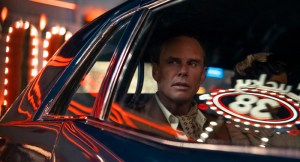15 Boundary-Pushing Movies That Broke Sexual Taboos
In this week's Total Recall, we take a look at some of cinema's most controversial moments.
Happy Valentine’s Day weekend, kinky film fans! Hearts, flowers and candy are nice if you like that sort of thing, but for those of a more…adventurous persuasion, your average rom-com simply won’t suffice for February 14 viewing. But never fear — your pals here at Rotten Tomatoes have taken it upon ourselves to put together a list of boundary-pushing film releases from the past, organized according to the taboos they busted. Remember that safe word, because it’s time for Total Recall!
Lockin’ Lips – The Kiss (1896)
Clocking in at under a minute, this 1896 short was commissioned by Thomas Edison for director William Heise, and features little more than a pair of actors (May Irwin and John Rice) recreating their smooch from the stage musical The Widow Jones. It’d be the stuff of little-seen YouTube uploads today, but at the time, the sight of people kissing on screen was nothing short of scandalous — as one review seethed, “The spectacle of the prolonged pasturing on each other’s lips was beastly enough in life size on the stage but magnified to gargantuan proportions and repeated three times over it is absolutely disgusting.” It all seems awfully quaint now, but it just goes to show you how social mores change over time.
Hips Don’t Lie – The Abyss (1910)
We’ve already established that audiences were scandalized by the sight of actors smooching in 1896’s The Kiss, and they were driven to distraction all over again roughly 15 years later by something almost as innocuous: the infamous “gaucho dance” depicted in Urban Gad’s The Abyss. The scene, which finds our protagonist Magda Vang (Asta Nielsen) seducing a potential conquest she’s lassoed to a chair, is exceedingly tame by today’s standards — but by the same token, there’s no mistaking Magda’s aim with that dance, and the notion that a young lady could possibly be so unabashedly forward on the silver screen was enough to send U.S. censors’ scissors into prudish conniptions. Already a leading lady of the stage when The Abyss was filmed, Nielsen enjoyed international stardom afterward (and married Gad, too).
Ménage à Quatre – Persona (1966) 91%
People who refuse to watch films with subtitles out of a misguided belief that they’re boring are cheating themselves in lots of ways — and anyway, lots of movies are well worth reading on the screen. Take Ingmar Bergman’s Persona, a career high point from the Swedish master that bedeviled censors with controversial content both visual (a quick glimpse of an erect penis) and aural (a monologue detailing one character’s adulterous outing with several underage boys and her subsequent abortion). Persona‘s pleasures run deeper than the merely prurient, however; as Richard Brody pointed out for the New Yorker, “Bergman blends a theatrical subjectivity with a tactile visual intimacy, with his characters, the objects close at hand, and the superb coastal landscape.”
The Innocence of Youth – Sweet Sweetback’s Baadasssss Song (1971) 73%
Like In the Realm of the Senses, Melvin Van Peebles’ Sweet Sweetback’s Baadasssss Song featured scenes of unsimulated sex — but Van Peebles decided to kick cinematic sand in another taboo’s eyes while he was at it, hiring his 13-year-old son Mario to stand in as Sweetback’s youthful proxy for a flashback scene depicting the character losing his virginity (to a prostitute, natch). A landmark for black filmmaking with or without its most provocative moments, Sweetback set off the Blaxploitation trend while earning approval from critics like the Chicago Reader’s Dave Kehr, who called it “A shrewd and powerful mix of commercial ingredients and ideological intent.”
Nun of Her Clothes On – The Devils (1971) 71%
Perhaps convinced he hadn’t elevated enough blood pressures with the nude male wrestling match he depicted in Women in Love, director Ken Russell kicked things up a notch with The Devils, which centers on the religious hysteria fomented in a 17th-century French town where the Church is convinced demonic tomfoolery is transpiring. As it turns out, they have a few things to worry about, including a nun orgy and a randy Vanessa Redgrave, who brings Our Lord and Savior down from the cross so she can have her way with Him. While a number of critics resented Russell’s over-the-top lurid approach, The Devils resonated with plenty of others, including Ken Hanke of the Mountain Xpress, who deemed it “Quite frankly one of the greatest films ever made. Period. No qualifiers are necessary.”
In Through the Out Door – Last Tango in Paris (1972) 81%
An erotic drama about a widower’s anonymous affair starring one of the most famous actors in the world, 1972’s Last Tango in Paris might have catapulted director Bernardo Bertolucci to infamy even if he hadn’t worked overtime to come up with the most deliberately transgressive sex scenes possible — including the infamous tête-à-tête that unravels after Marlon Brando tells Maria Schneider to “go get the butter.” Neither Brando nor Schneider were happy with Bertolucci after making Paris; in fact, Schneider held a grudge against the director for the rest of her life. No apologies were necessary for most critics, however — and some of them even saw past all the steamy goings-on, including Jamie Russell of the BBC, who argued that it’s “actually a dark, torrid masterpiece about love and grief.”
Cunning Linguistics – Don’t Look Now (1973) 93%
Nicolas Roeg’s Don’t Look Now — a 1973 adaptation of the Daphne du Maurier short story about a pair of grieving parents (Donald Sutherland and Julie Christie) haunted by memories (and possibly more) of their dead daughter — is probably one of the least sexy films on this list. For the bulk of its running time, it’s a stylishly creepy meditation on grief with a dash of supernatural horror tossed in — but then there’s that one scene where Sutherland and Christie are getting ready to go out for the evening, and they opt for a nude interlude in which Sutherland… orders an appetizer. So realistic that rumors persisted for decades the on-screen coitus was unsimulated, it earned Don’t Look Now an X rating in the U.S., but it certainly didn’t damage the movie’s standing with critics. “It’s a ghost story; it’s a meditation on time, memory and the poignancy of married love,” wrote Peter Bradshaw for the Guardian. “And it’s a masterpiece.”
Ain’t Nothing Like the Real Thing – In the Realm of the Senses (1976) 84%
Onscreen sex can seem awfully realistic, but we take it as a given that it’s simulated — except in the rare instances when the stars are actually in flagrante delicto. For example, there’s Nagisa Oshima’s In the Realm of the Senses, an overall forcefully provocative drama about the increasingly sordid affair between a former prostitute (Eiko Matsuda) and the owner of the hotel where she works as a maid (Tatsuya Fuji). Also noteworthy for its (definitely no pun intended) climactic scene in which Fuji suffers a fate familiar to anyone who’s watched Lars von Trier’s Antichrist, Senses raised eyebrows for its depictions of unsimulated sexual activity (and later shook booties with the Chaz Jankel song “Ai No Corrida,” inspired by the movie’s Japanese title) — and wowed critics like Empire’s David Parkinson, who called it “An undeniably powerful, stylish and impressive piece of work.”
A Love Most Fowl – Howard the Duck (1986) 13%
Sometimes, what works on the page just doesn’t seem right on the screen. Take, for example, the infamous Howard the Duck, which took Marvel’s beloved off-kilter cult comic — rife with counter-culture humor and endowed with a richly subversive point of view — and turned it into a cruddy would-be comedy in which a creepy-looking duck tries to get it on with Lea Thompson. Neither smart nor funny enough for adult audiences, and too clumsily dark and ribald for kids, Howard went down in history as one of cinema’s biggest duds — as well as the one and only time a screenwriter attempted a duck-woman pairing. That contribution to history aside, this turkey has few friends in the critical sphere aside from the Orlando Sentinel’s Jay Boyar, who argued, “It’s hard to fault the tongue-in-bill high spirits of a movie like Howard the Duck.”
Our Father Who Art Getting It On – The Last Temptation of Christ (1988) 82%
Religious folk tend to get a little testy when Jesus is depicted as fallible in any fundamental way, and the conservative community reacted to the news of Martin Scorsese’s The Last Temptation of Christ by marshalling the moral majority long before a single frame of the film had even been screened. Their concerns were met with a movie that, while ultimately more or less faithful to the rough contours of the crucifixion story, added a few narrative wrinkles that disturbed less accommodating viewers — including a brief scene that depicted Christ (Willem Dafoe) consummating his marriage to Mary Magdalene (Barbara Hershey). Controversy aside, the end result resonated with many critics, including Carol Cling for the Las Vegas Review-Journal, who wrote that it was “Stunning and heartfelt; Scorsese at the height of his power and artistry.”
I See Neither London Nor France – Basic Instinct (1989) 56%
All things considered, Paul Verhoeven’s Basic Instinct is little more than a slickly assembled, eminently well-cast upgrade from your average late ’80s/early ’90s late-night softcore thriller. But even a little dramatic heft can go an awfully long way when a filmmaker is offering some extra T&A — and Instinct packed some extra taboo-busting firepower in the form of its most famous scene, during which femme fatale Sharon Stone toys with her interlocutors during police questioning by languidly crossing her legs and giving the cops (not to mention all the folks in the audience) a glimpse of what her mama gave her. Often imitated, never duplicated (not even in the long-delayed, ill-advised sequel), Instinct‘s enthusiastically trashy box office triumph inspired a slew of similarly wardrobe-challenged dramas in the years to come, although few if any inspired the level of modest critical acclaim expressed in Basic reviews like the one written by Antagony & Ecstasy’s Tim Brayton, who mused, “Through all this, there remains that calm center of nasty, brilliant social insight.”
Brought to You by the Letters S and M – Secretary (2002) 78%
Before E.L. James built a publishing empire out of Anastasia and Christian’s sadomasochistic exploits, the film world had its own celebrity dominating/submissive couple: E. Edward Grey (James Spader) and Lee Holloway (Maggie Gyllenhaal), whose decidedly unorthodox love affair is chronicled in Steven Shainberg’s 2002 film Secretary. Expanded and adapted from author Mary Gaitskill’s short story Bad Behavior, it earned a small mountain of acclaim (including a Sundance Special Jury Prize) while raising countless eyebrows with its depiction of a relationship that, loosely speaking, begins with the new confidence awakened in an emotionally troubled young woman after her boss gives her a spanking in the office. But under the surface, wrote Karen Montgomery for Cinerina, “It’s an interesting exploration of people finding and accepting themselves and then finding the puzzle piece that fits this new shape.”
Blow the Man Down – The Brown Bunny (2004) 48%
Lest you ever doubt the depth and breadth of Chloe Sevigny’s acting talent, simply remind yourself that she found a way to rebound from the salacious stir that erupted around her appearance in Vincent Gallo’s The Brown Bunny. Booed at Cannes (and deemed the worst film in the history of the festival by Roger Ebert), it’s probably chiefly remembered for a sequence in which Sevigny performs an apparently unsimulated oral sex act on Gallo — and while Bunny does have its share of defenders, it hasn’t aged as well as Sevigny, who’s gone on to earn widespread respect for her work in projects like Zodiac and the HBO drama Big Love.
Strings Attached – Team America: World Police (2004) 77%
Okay, so maybe puppet intercourse isn’t really anyone’s idea of a taboo, but we’d be remiss if we left off the unforgettable sex scene between Gary Johnston (Trey Parker) and Lisa Jones (Kristen Miller) in Team America: World Police, which found South Park creators Parker and Matt Stone sending up bombastic action movie clichés with the puerile glee of the world’s most brilliantly subversive fifth-grade boys. With puppets for stars, Parker and Stone were freed to make this scene almost as filthy as they wanted, and they took advantage with a wildly over the top few minutes that somehow still manages to feel more lifelike than the boudoir romp from Top Gun. “The puppets are extremely impressive,” observed Matthew Turner for ViewLondon, “and the fact that the strings are constantly visible is used to brilliant comedic effect, particularly during one of the film’s crudest scenes.”
The Love That Dare Not Speak Its Name – Brokeback Mountain (2005) 88%
A campfire, the Wyoming stars, bonding over the satisfaction of a hard day’s work… what could be more romantic, right? And yet some viewers were still scandalized by Brokeback Mountain, Ang Lee’s 2005 adaptation of the Annie Proulx short story about a pair of ranch hands (Heath Ledger and Jake Gyllenhaal) whose sheep-herding gig blooms into a secret affair that changes the lives of both men and their families — and not necessarily in a good way. Brokeback met a far cheerier fate at the box office, where it earned nearly $200 million while reaping scads of positive reviews on its way to netting three Academy Awards (including Best Director for Lee) against eight nominations. “If you have the patience to sit through a slow-moving romance and you lack the vanity to be put off by explicit cowboy on cowboy relations,” suggested Brian Marder of Hollywood.com, “you’ll greatly appreciate the light at the end of Brokeback Mountain, a work of art that’s more than just a movie.”
Finally, here’s the earliest example of on-screen censorship, as displayed in Thomas Edison’s 1897 short, Fatima:







